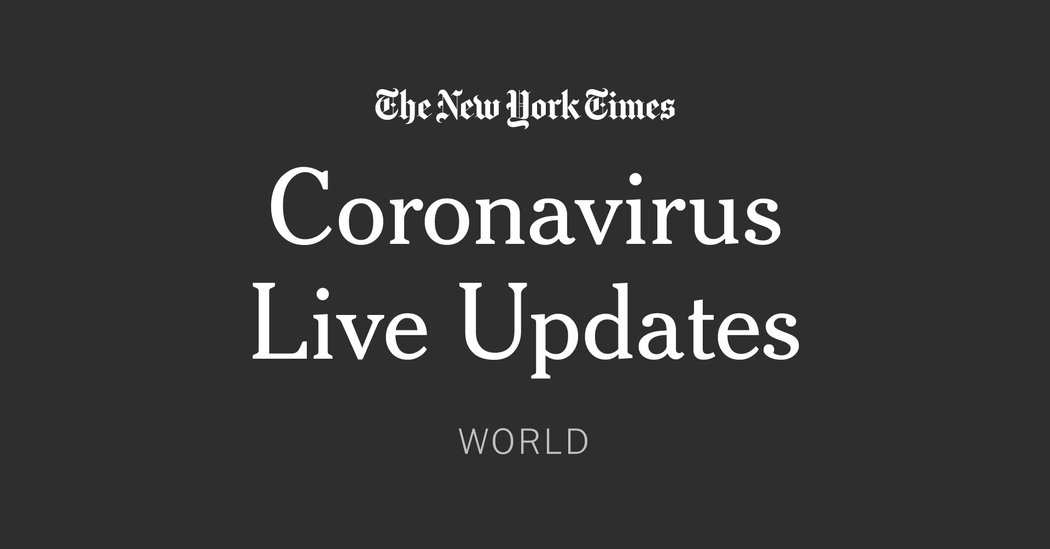An outbreak in Nigeria is just one of Africa’s alarming hot spots.
The coronavirus has been relatively slow to take hold in Africa, but blazing hot spots are beginning to emerge on the continent.
In Somalia’s capital, Mogadishu, officials say that burials have tripled. In Tanzania, after cases suddenly rose and the U.S. Embassy issued a health alert, the government abruptly stopped releasing its data two weeks ago.
Officially, Kano, with an estimated population of five million, has reported 753 infections and 33 related deaths, but those numbers do not reflect what health workers and residents say they are seeing on the ground.
Kano’s state government, until recently, claimed a spate of unusual deaths was caused not by the coronavirus, but by hypertension, diabetes, meningitis or acute malaria. There is little social distancing, and few people are being tested.
“The leadership is in denial,” said Usman Yusuf, a hematology-oncology professor and the former head of Nigeria’s national health insurance agency. “It’s almost like saying there is no Covid in New York.”
Kano’s location, population and connectivity to the rest of the region mean the consequences of an uncontrolled outbreak could be severe.
Already there are reports of hundreds more people dying what some officials call “mysterious deaths” in Nigeria’s northern states of Jigawa, Yobe, Sokoto and Katsina.
“If Kano falls, the whole of northern Nigeria falls. The whole of Nigeria falls,” Dr. Yusuf said. “It spreads into the whole of West Africa and the whole of Africa.”
Officials concerned about a virus resurgence have quarantined 8,000 people and reintroduced lockdown measures in northeastern China, even as other parts of the country further relax restrictions.
Residents of Jilin, the second-largest city in Jilin Province, have been mostly barred from leaving the city, state news media reported, after a cluster of infections was reported there and in Shulan, another city under its administration. Shenyang, capital of the neighboring province of Liaoning, said on Saturday that anyone who had traveled there from the city of Jilin since April 22 would be quarantined in a hospital for three weeks.
Jilin has traced nearly 700 contacts of coronavirus patients for testing and quarantine, while officials in Liaoning Province have found more than 1,000 contacts and about 6,500 people at high risk for infection.
China reported five new confirmed infections on Saturday, three of them locally transmitted in Jilin Province and two from overseas. The country has reported more than 89,000 total cases and 4,634 deaths.
Zhong Nanshan, a respiratory disease expert and adviser to the Chinese government, said in an interview with CNN on Saturday that although China had a relatively low number of infections it still faced a “big challenge” because most of the population had not been exposed to the coronavirus and was still susceptible to infection. “It’s not better than the foreign countries I think at the moment,” he said.
Elsewhere in China, the Beijing Center for Disease Prevention and Control said on Sunday that it was no longer necessary to wear masks outdoors. The capital, which has reported no new infections for 30 days, is preparing for the annual session of the National People’s Congress, a major gathering that had been postponed for more than two months.
And in southern China, the governments of Hong Kong, Macau and Guangdong Province are discussing the creation of a “travel bubble” that would allow qualified residents to travel around the region without being required to quarantine.
The lockdown was set to expire on Sunday. But India’s home ministry said restaurants, malls, schools and religious centers would stay closed until at least May 31, along with domestic and international travel. Officials relaxed rules on barbershops and interstate bus service, except in certain hot spots.
The new rules came about two weeks after India started loosening its strict lockdown, which was imposed in late March. Small wedding ceremonies were permitted earlier this month, and many businesses have reopened, including liquor stores, pet shops and electrical stores.
India, a country of 1.3 billion people, has reported more than 90,000 cases and more than 2,800 deaths.
Testing remains largely restricted to symptomatic cases, but there is some evidence that the lockdown has helped flatten India’s coronavirus growth curve. In late March, it took just three days for the number of identified cases to double. Now, it is taking almost two weeks.
But Indian officials have treaded carefully in recent days, responding to a surge of cases in places like Mumbai, India’s most densely populated city. Health care workers have reported a rise in cases in slum areas like Dharavi, where many families live eight to a room and social distancing is nearly impossible.
In a television address earlier this week, Prime Minister Narendra Modi called for patience with the lockdown measures and announced a relief package of more than $260 billion to try to rescue India’s devastated economy.
Driving in the United States and Europe is picking up a little, and some auto workers have headed back into factories. Refineries in China are buying more oil as that country’s economy reopens. Saudi Arabia and Russia ended their price war and slashed production, and American oil companies are decommissioning rigs and shutting wells.
All those developments have helped push up oil prices modestly in recent weeks, after they had reached historic lows amid the pandemic.
On Friday, U.S. oil futures climbed more than 7 percent to nearly $30 a barrel. That may seem like a minor miracle given that the price was about $30 below zero last month, as some traders paid buyers to take oil off their hands.
“May, it seems, is a month when traders can finally sit back more comfortably for a moment and take a breath,” said Bjornar Tonhaugen, head of oil market research at Rystad Energy, a research and consulting firm. “But we warn that the second half of the year will not be met with precrisis oil prices again, as the gigantic oil stock overhang must first be worked down.”
On the supply side, major producers including Saudi Arabia, Russia, Canada and Norway are reducing production rapidly. The most drastic cuts are coming in the United States, where a frenzy of drilling in shale fields led to a doubling of production in recent years.
Shi Zhengli, the Chinese virologist whose research made her a target of unsubstantiated theories that the coronavirus escaped from a government lab in the city of Wuhan, has published new findings after weeks of largely staying out of the public eye.
Dr. Shi, a prominent researcher at the Wuhan Institute of Virology, has rejected accusations that the virus emerged from her lab. The Trump administration has pushed American intelligence officials to hunt for evidence to support this unproven theory as it escalates a public campaign to blame China for the pandemic. Intelligence agencies are skeptical that such evidence can be found and scientists say it most likely leapt from animal to human in a non-laboratory setting.
Dr. Shi has been called “the bat woman” by the Chinese news media because of her years of experience studying the links between bats and viruses. As the new coronavirus outbreak erupted, she helped establish that the new virus had most likely come from a bat. But she came under scrutiny both in China and abroad as people questioned whether the virus had come from her laboratory — either intentionally or accidentally.
The findings bolster the idea that the Chinese horseshoe bat is the natural host of coronaviruses like the ones that cause SARS and Covid-19, the paper said. “Continued surveillance of this group of viruses in bats is necessary for the prevention of the next SARS-like disease.”
When President Emmanuel Macron repeatedly declared “war” on the coronavirus in March, he solemnly promised that France would support “front-line” health workers with “the means, the protection.”
The reality was that France was nearly defenseless.
The government’s flip-flopping policies on past pandemics had left a once formidable national stockpile of face masks nearly depleted. Officials had also outsourced the manufacturing capacity to replenish that stockpile to suppliers overseas, despite warnings since the early 2000s about the rising risks of pandemics.
That has left France — unlike Germany, its rival for European leadership — dependent on foreign factories and painfully unable to ramp up domestic production of face masks, test kits, ventilators and even the thermometers and over-the-counter fever-reducing medicines to soothe the sick.
Today, as it has begun loosening one of the world’s strictest lockdowns, France has become a case study in how some countries are now reconsidering their dependence on global supply chains built during the past two decades on the mantra of low costs and quick delivery. Even now, France has no guarantees that it can secure enough supplies in the coming weeks to protect against a potential second wave of the virus.
Louis Gautier, the former director of the General Secretariat for Defense and National Security, a powerful inter-ministerial unit inside the prime minister’s office that coordinates the response to large-scale crises, said: “The issue of strategic stocks and secure supplies has to be reconsidered. A new model has to be invented.”
Every year, Swaminathan Vinayakram and his band leave their homes in the South India city of Chennai to play with musicians across the United States.
The band — 3G, which stands for three generations — includes his grandfather Vikku, a Grammy-nominated percussionist who plays the gatham, a clay pot. In early March, they landed in Houston and played to a crammed crowd of 400 that swayed to the music and threw back drinks.
Then the world seemed to stop.
The coronavirus outbreak meant that their shows from San Francisco to New York were canceled. So were their collaborations with American jazz musicians that would have fused saxophones and piano with the upbeat rhythms of South India’s Carnatic music and its centuries-old instruments.
On March 19, India gave its citizens abroad two days to return before shutting down all international travel. As a rush ensued among the 17.5 million Indians in the world’s largest diaspora, 3G managed to get only three tickets for its five-person band.
Mr. Vinayakram, 27, and his father stayed behind in Jersey City, N.J., and the confinement grated on them. So Mr. Vinayakram did something from the 1990s, when the internet was a thrilling innovation and globalism all the rage: He posted a call-out to musicians for collaborations.
Now, he has connected to a more diverse set of musicians than ever.
“Through Facebook I’m meeting musicians I’ve never heard of, or that I would never have dreamed of playing with,” he said in a telephone interview.
Dozens have sent him tracks of their improvisations, which he overlays with the kanjira, a South Indian frame drum with a pair of jingles.
But he is still eager for the pandemic to end. He misses the thrill of playing to a live audience.
“When I was a child, I used to dream about playing live to thousands of people,” Mr. Vinayakram said. “It now feels like a dream again.”
Now that nearly all the states that imposed stay-at-home orders to fight the pandemic have begun to ease them, governors say it’s gotten more complicated than ever to try to balance conflicting imperatives.
“The question is, how do you toggle back and make meaningful modifications to the stay-at-home order?” Gov. Gavin Newsom of California said Sunday on CNN’s “State of the Union.” “And that’s where we’re now in this point of friction and a lot of frustration.”
Like a number of other governors, Mr. Newsom, a Democrat, has seen his decisions draw criticism from many sides, as either painfully slow or recklessly fast.
The debates around the country have also centered on how to account for the uneven toll of the virus throughout the United States.
Appearing on the same CNN show, Alex M. Azar II, the secretary of health and human services, suggested that the high death toll from Covid-19 was tied to the prevalence of underlying health issues in minority communities.
“Unfortunately, the American population is very diverse, and it is a population with significant unhealthy co-morbidities that do make many individuals in our communities, in particular African-American minority communities, particularly at risk,” Mr. Azar said.
“That is an unfortunate legacy of our health care system that we certainly do need to address,” he added.
“More than anything, this pandemic has fully, finally torn back the curtain on the idea that so many of the folks in charge know what they’re doing,” Mr. Obama said.
Every five days, Daniel Ordoñez opens 1,400 pipe taps in a waterfront hotel in Barcelona, Spain, that locals call “The Sail” because of its shape.
Each tap has to run for about five minutes, so the task takes him a full day. “It’s probably the most boring part of my job, but it’s needed,” he said, to avoid a form of pneumonia that can be spread by bacteria in the water: Legionnaires’ disease.
Mr. Ordoñez, who is in charge of maintenance at the hotel, has been its sole continuous occupant for the past two months, wandering its ghostly halls because of another illness that has ravaged the country and the globe: Covid-19.
He now lives alone on the 24th floor, which gives him an unrivaled view of the city, its beaches and the Mediterranean. “At the start, I thought I would be here for about two weeks,” said Mr. Ordoñez, who is single. “But now it’s been eight, with no clear end in sight.”
Every year on May 17, Norway throws a nationwide celebration in honor of the 1814 signing of the Constitution, with parades in every town and village, outdoor games, and festive gatherings of families and friends — not unlike the Fourth of July in the United States. But this year, the coronavirus radically upended the festivities.
With crowds capped at 50 people to avoid the spread of the virus, nearly every major public event that could draw people on Constitution Day was canceled, including the children’s parade in Oslo, the capital, which normally features a marching band that snakes down the street in front of the Royal Palace.
The palace square was closed to the public, and most shows were replaced with marching bands and speeches streamed online. On the southwestern coast, 1,000 Norwegian flags were planted in the sand, with equal distance between them to symbolize the social distancing citizens must follow.
At 1 p.m., Norwegians took part in a nationwide synchronized singing of the traditional May 17 song from their homes. The king, queen and other royals appeared on their balcony to join the singing.
Afterward, several members of the family took a previously unannounced car ride through the streets of Oslo, using the same car that carried members of the royal family through the streets in 1945, when they returned from exile after the German occupation.
Reporting was contributed by Clifford Krauss, Ruth Maclean, Abdi Latif Dahir, Simon Marks, Kai Schultz, Mihir Zaveri, Karen Zraick, Andrea Kannapell, Iliana Magra, Raphael Minder, Dan Bilefsky, Norimitsu Onishi, Constant Méheut, Tiffany May, Vivian Wang, Maria Abi-Habib, Henrik Pryser Libell, Mike Baker, Andrew E. Kramer, Motoko Rich, Hisako Ueno, Hikari Hida, Audra D.S. Birch, John Eligon, Michael D. Shear, Michael Levenson, Sheila Kaplan, Ernesto Londoño, Manuela Andreoni and Letícia Casado.


















39 Black Friday Deals Under $50 (2020): Cases, Speakers, Leggings, and More